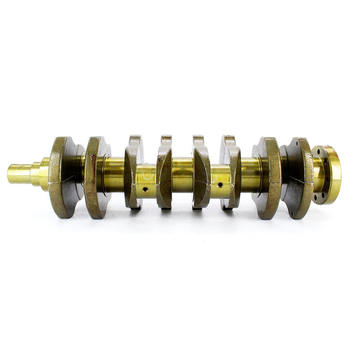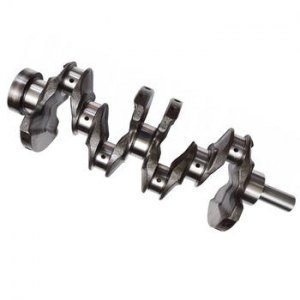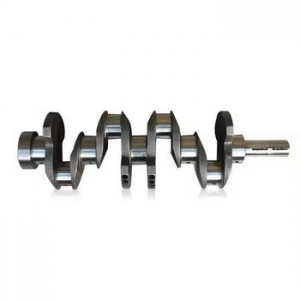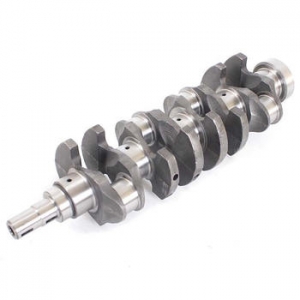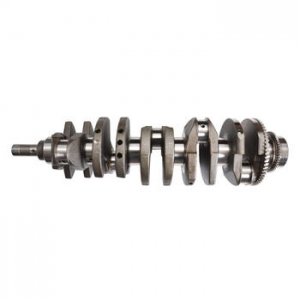The crankshaft, specifically the OEM 12200-06J02 part designed for the Nissan TD42 engine, forms the very backbone of this robust and reliable power plant. This particular component isn't just another piece of metal; it's the heart that converts the linear motion of the pistons into the rotational force that ultimately drives your Nissan vehicle. Understanding its role, its construction, and the importance of using the correct OEM specification is paramount for maintaining the longevity and performance of your TD42 engine. Imagine the pistons firing in sequence, each pushing down with tremendous force. The crankshaft is the ingenious mechanism that harnesses this energy, smoothing it out and delivering it as usable power. Without a properly functioning crankshaft, the engine is simply a collection of static parts.
Understanding the Nissan TD42 Crankshaft
The crankshaft of the Nissan TD42 engine, especially when we're talking about the OEM 12200-06J02 part number, is designed with specific engineering considerations in mind. The TD42 is known for its durability and robust nature, often found in heavy-duty applications like Nissan Patrols and other commercial vehicles. Consequently, the crankshaft must withstand immense stresses from the combustion process. These stresses are both torsional (twisting) and bending, arising from the reciprocating motion of the pistons and the forces exerted during each combustion cycle. The OEM crankshaft is carefully manufactured with precisely balanced counterweights. These are crucial for minimizing vibrations and ensuring smooth engine operation. An unbalanced crankshaft can lead to premature wear on bearings, increased noise, and reduced engine life. The material selection also plays a significant role; typically, these crankshafts are forged from high-strength steel alloys to withstand the extreme pressures and temperatures they encounter.
The Importance of OEM Specification (12200-06J02)
When it comes to replacing the crankshaft in your TD42 engine, using the OEM (Original Equipment Manufacturer) part, specifically the 12200-06J02, is crucial. While aftermarket options might seem tempting due to their lower price points, they often fall short in terms of quality, materials, and dimensional accuracy. The OEM crankshaft is designed and manufactured to the exact specifications of the Nissan TD42 engine. This ensures proper fitment, optimal balance, and maximum durability. Using a non-OEM crankshaft can lead to a host of problems. Imagine an aftermarket crankshaft that's slightly out of balance. Over time, this imbalance will place undue stress on the engine bearings, potentially leading to premature failure and costly repairs. Similarly, if the aftermarket crankshaft isn't made from the same high-strength steel alloy as the OEM part, it might not be able to withstand the extreme forces within the engine, potentially leading to cracks or even catastrophic failure. What's the cost of risking your entire engine's health for a small initial saving?
Common Issues and Symptoms of Crankshaft Failure
Even with the robust design of the OEM 12200-06J02 crankshaft, it's not immune to wear and tear. Several factors can contribute to its failure, including improper lubrication, engine overheating, and excessive engine speeds. Identifying the symptoms of a failing crankshaft early can prevent further damage to the engine. Common signs of crankshaft problems include unusual engine noises, particularly a knocking or thumping sound that increases with engine speed. This sound is often caused by worn crankshaft bearings. Another symptom is excessive vibration. If you notice that your engine is vibrating more than usual, especially at higher RPMs, it could indicate a problem with the crankshaft's balance. You might also experience a loss of power or reduced fuel economy as the engine struggles to operate efficiently with a damaged crankshaft. Low oil pressure can also be a sign, as worn bearings can increase the clearances within the engine, leading to reduced oil pressure. If you experience any of these symptoms, it's crucial to have your engine inspected by a qualified mechanic to diagnose the problem and determine the appropriate course of action.
Maintenance and Care for Your TD42 Crankshaft
Proper maintenance is key to extending the lifespan of your Nissan TD42 crankshaft. This starts with regular oil changes using high-quality oil that meets Nissan's specifications. Clean oil provides adequate lubrication to the crankshaft bearings, reducing friction and wear. Maintaining the correct oil level is also crucial. Low oil levels can lead to inadequate lubrication and overheating, both of which can damage the crankshaft. Preventing engine overheating is another critical aspect of crankshaft maintenance. Overheating can weaken the metal of the crankshaft and cause it to warp or crack. Regularly check your coolant levels and ensure that your cooling system is functioning properly. Avoiding excessive engine speeds (over-revving) can also help protect your crankshaft. Exceeding the engine's recommended RPM limit can place undue stress on the crankshaft and other engine components. Finally, consider having your engine professionally inspected periodically, especially if you use your vehicle for heavy-duty applications. A mechanic can identify potential problems early and prevent them from escalating into major repairs.
The Replacement Process: OEM 12200-06J02 Installation
Replacing the crankshaft is a complex and labor-intensive process that should ideally be performed by a qualified mechanic. It involves disassembling a significant portion of the engine, including removing the cylinder head, pistons, and connecting rods. Before installing the new OEM 12200-06J02 crankshaft, it's essential to thoroughly inspect the engine block and bearings for any signs of wear or damage. The crankshaft bearings should be replaced at the same time as the crankshaft to ensure proper clearance and lubrication. The new crankshaft should be carefully installed, paying close attention to the bearing clearances and torque specifications provided by Nissan. Using a torque wrench to tighten the main bearing caps to the correct torque is crucial to prevent bearing damage and ensure proper crankshaft alignment. Once the crankshaft is installed, the pistons, connecting rods, and cylinder head can be reassembled. After the engine is reassembled, it's important to prime the oil system and start the engine to check for any leaks or unusual noises. Remember, precision and adherence to specifications are paramount during this process.
Benefits of Using a Genuine Nissan Crankshaft
Choosing a genuine Nissan crankshaft, specifically the OEM 12200-06J02 part, offers numerous benefits over aftermarket alternatives. As mentioned earlier, OEM parts are designed and manufactured to the exact specifications of the Nissan TD42 engine, ensuring proper fitment, optimal performance, and maximum durability. Using a genuine Nissan crankshaft helps maintain the original performance and reliability of your engine. It also ensures that your engine will meet Nissan's emissions standards. Genuine Nissan parts are also backed by Nissan's warranty, providing peace of mind and protection against defects. Furthermore, using genuine parts can help maintain the resale value of your vehicle. Potential buyers are often more willing to pay a premium for a vehicle that has been properly maintained with genuine parts. The investment in a genuine Nissan crankshaft is an investment in the long-term health and performance of your engine. Think of it as preventative maintenance that saves you from potentially catastrophic failures down the line. Do you really want to compromise on the most vital component of your engine?
Troubleshooting: Problems After Crankshaft Replacement
Even with a meticulous replacement of the crankshaft using the OEM 12200-06J02 part, issues can sometimes arise. If you experience problems after a crankshaft replacement, it's essential to systematically troubleshoot the potential causes. One common issue is oil leaks. Leaks can occur if the crankshaft seals are not properly installed or if they are damaged during installation. Carefully inspect the front and rear crankshaft seals for any signs of leaks. Another potential problem is unusual engine noises. Knocking or thumping sounds could indicate issues with bearing clearances or crankshaft alignment. Ensure that the main bearing caps were torqued to the correct specifications. If the engine vibrates excessively after the replacement, it could indicate a problem with crankshaft balance. In rare cases, a newly installed crankshaft might be slightly out of balance, even if it's an OEM part. Finally, check the engine's oil pressure. Low oil pressure could indicate worn bearings or a problem with the oil pump. A thorough inspection of all engine components and a careful diagnosis of the symptoms are essential for resolving any problems that arise after a crankshaft replacement. Sometimes, a fresh set of eyes (another mechanic) can help identify something that was overlooked.
The Future of the TD42 Engine and Crankshaft Technology
While the Nissan TD42 engine might be considered an older design, it remains a popular choice for its reliability and durability, especially in off-road and heavy-duty applications. As such, the OEM 12200-06J02 crankshaft and its role remain relevant for maintaining and restoring these engines. While significant technological advancements haven't drastically changed the fundamental design of the crankshaft itself (it still needs to convert linear to rotary motion!), improvements in materials and manufacturing processes are continuously being explored. For example, advancements in steel alloys and forging techniques could lead to crankshafts that are even stronger and more resistant to wear. Similarly, improved balancing methods could further reduce engine vibrations and enhance smoothness. As long as the TD42 continues to be used and loved, the availability of quality replacement parts, particularly the OEM crankshaft, will remain crucial for enthusiasts and professionals alike. Are there any aftermarket innovations that might challenge the long-standing dominance of the OEM crankshaft in the future? Time will tell!
Conclusion: The Indispensable Crankshaft for Nissan TD42 - OEM 12200-06J02
In conclusion, the crankshaft, and specifically the OEM 12200-06J02 part for the Nissan TD42 engine, is an absolutely indispensable component. Its crucial role in converting linear motion into rotational force makes it the heart of the engine. Understanding its function, recognizing the symptoms of failure, and adhering to proper maintenance practices are all vital for ensuring the longevity and optimal performance of your TD42 engine. Moreover, choosing the correct OEM specification crankshaft during replacement is not just recommended, it's essential for maintaining the engine's integrity and reliability. The Nissan TD42, known for its robustness, deserves nothing less than the precision and quality offered by the OEM 12200-06J02 crankshaft. The investment in this vital component translates directly into a more reliable and powerful driving experience.
`
